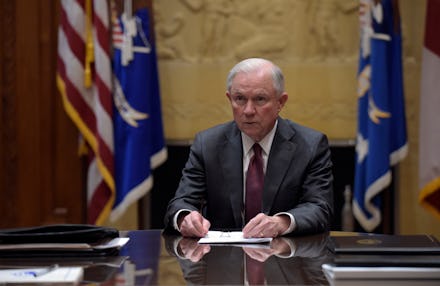Jeff Sessions talked with the Russian ambassador twice — and then told Congress he didn't

Senior Department of Justice officials allege Attorney General Jeff Sessions was in contact with Russian Ambassador Sergey Kislyak during the 2016 presidential campaign, and then Sessions later told Congress no such contact occurred, the Washington Post reported on Wednesday.
One of the two discussions in question was a closed-door September meeting with Kislyak in the then-senator's office, and came amid what intelligence agencies now allege was a Putin-directed campaign to throw the election in favor of President Donald Trump by leaking embarrassing information about his Democratic opponents.
Despite efforts by Trump and some prominent Republicans to kill the story, details of Trump and his inner circle's ties to Russia have continued to beleaguer his presidency. Michael Flynn, Trump's national security adviser, resigned after it was leaked he discussed sanctions with Kislyak before Trump's inauguration and later lied about it to other White House officials including Vice President Mike Pence.
Sessions repeatedly said he was not aware of any discussions between him or other Trump campaign members at congressional hearings. He told Sen. Al Franken (D-Minn.) at a Jan. 10 Judiciary Committee hearing "I have been called a surrogate at a time or two in that campaign and I did not have communications with the Russians," the Post noted.
Later, he responded to Sen. Patrick Leahy (D-Vt.) with nothing more than a "no" when asked if he had been "in contact with anyone connected to any part of the Russian government about the 2016 election, either before or after election day?"
Department officials and Sessions' spokeswoman Sarah Isgur Flores said Sessions does not recall the subjects of the two discussions but that Sessions was meeting with Kislyak in his official capacity as a member of the Senate Armed Services Committee. When the Post asked all 26 members of the committee if they had met with Kislyak, all 19 who responded said no.
South Carolina Sen. Lindsey Graham said there should be a special prosecutor on the case on Wednesday night. House Minority Nancy Pelosi called on Sessions to resign.
Confounding the situation is another the New York Times scoop released Wednesday evening alleging President Barack Obama's administration sought to preserve files from investigations into Trump-Russia ties, fearing a future President Trump might destroy or hide them.
According to the Times report, U.S. allies including the U.K. and the Netherlands provided intelligence showing people close to Trump had met with Russian government officials "and others close to Russia's president, Vladimir Putin" as other U.S. investigators were piecing together intercepted Russian communications concerning contacts with Trump associates.
It remains unclear what those contacts were, since the intelligence agencies have not released details. In theory, they could range from innocuous to conversations about Trump's sprawling worldwide business empire or even, as top Democrats have suggested, collusion with Russian spies trying to throw the election.
As president, Trump controls the intelligence and law enforcement agencies that in turn control the amount of information made available to Congress. The FBI, House and Senate are all mounting their own investigations.
Sean Spicer, the White House's press secretary, scoffed off the Times story and told the paper Obama staff were merely attempting to "create a false narrative to make an excuse for their own defeat in the election."
He is likely to be joined by many top Republicans who have sought to limit related inquiries. After details of Flynn's call with Kislyak were leaked, House Oversight Committee chair Rep. Jason Chaffetz (R-Utah) said the situation was "taking care of itself" and called instead for an investigation into who provided the information to the press.
March. 1, 2017, 11:55 p.m. EST: This article has been updated.